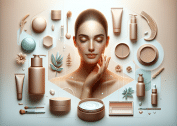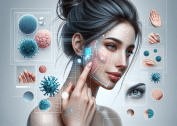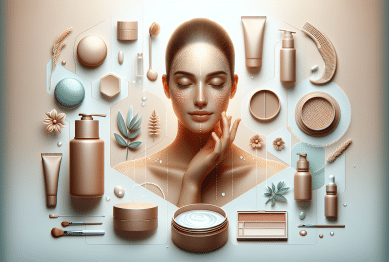Curious about collagen? This guide unpacks everything you need to know about collagen’s role in skin wellness, how it supports natural beauty, and the science behind collagen supplements. Discover how collagen impacts not only your skin’s appearance but also joint comfort and healthy aging, embracing a holistic approach to beauty and wellness.
What Makes Collagen Essential for Skin Health?
Collagen is at the heart of any conversation about youthful, glowing skin. It acts as the scaffolding that holds skin cells together, creating natural firmness and elasticity. When collagen levels are high, skin appears plumper, more hydrated, and less prone to visible lines. This protein is produced naturally in the body, but factors like age, diet, sun exposure, and stress can decrease its production, making collagen a huge focus for beauty-conscious individuals seeking lasting skin health. Studies from reputable sources highlight that adequate collagen helps maintain not just a smooth texture, but also resilience against daily wear and tear (https://www.ncbi.nlm.nih.gov/pmc/articles/PMC6835901/).
The beauty industry often points to collagen as the secret behind a radiant appearance, but its benefits go deeper than aesthetics. Collagen forms about 75% of the dry weight of your skin, making it critical for both structure and function. As this protein diminishes over time, skin may become thinner, drier, and more prone to wrinkles. Recent research supports the connection between declining collagen and visible aging signs. Environmental factors like pollution or UV light can accelerate this decline even faster, which is why many people look for ways to bolster their skin’s natural reserves.
Caring for collagen isn’t just about topical skincare—it’s a whole-body concern. Dermatologists and nutritionists agree that protecting collagen starts with healthy living: balanced diets rich in vitamins, proper sun protection, and stress management all help protect your natural collagen supply. Learning about this protein can empower more informed decisions, whether for prevention or for targeting visible issues. Collagen’s role goes beyond a trend; it’s rooted in medical science to promote lasting beauty from within.
Collagen Supplements: Evidence, Myths, and Results
Collagen supplements can be found in powders, capsules, and drinks. The idea is to support skin’s natural structure from the inside. Scientific reviews have explored how hydrolyzed collagen—broken into smaller pieces for absorption—might improve skin hydration, firmness, and smoothness, especially when taken consistently over several months. While not a miracle, some controlled studies show that daily collagen intake can boost skin’s elasticity and appearance for certain adults (https://ods.od.nih.gov/factsheets/Collagen-Consumer/).
The promise of more youthful skin with collagen supplements is appealing, but expectations must be realistic. Not everyone notices dramatic results, and effects vary depending on age, lifestyle, and genetics. Supplements may help those with lower dietary protein intake or rapid age-related decline, but whole-body wellness—hydration, sleep, and broad nutrient intake—remains crucial. Experts caution that while some see softer fine lines, others might notice benefits in nail strength or joint comfort instead.
A key myth is that simply ingesting collagen instantly turns back the clock. In reality, the body digests collagen into amino acids, which then become building blocks for many tissues, not just skin. That means supplementing collagen can support wellness, but it’s not a shortcut. Combining smart supplementation with attention to lifestyle habits typically delivers the clearest improvements. Seek evidence-based information and consult a healthcare provider for personal guidance.
Diet and Lifestyle Choices That Boost Collagen Naturally
Food choices play a central role in supporting your body’s natural collagen factory. Protein-rich foods like lean meat, fish, eggs, dairy, and legumes supply amino acids that form collagen fibers. Collagen-boosting foods rich in vitamin C—such as citrus fruits, strawberries, and bell peppers—help the body knit these fibers together. Minimizing ultra-processed foods and refined sugars is recommended, since these can damage collagen and speed up aging over time (https://www.hsph.harvard.edu/nutritionsource/vitamin-c/).
Skin-friendly habits matter just as much as nutrition. Routine sun protection is vital, because UV rays break down collagen and reduce its production. Protective clothing, broad-spectrum sunscreen, and limiting midday sun exposure can dramatically slow skin’s visible aging. Hydration also influences the skin’s texture and softness, and regular moderate exercise is linked to improved circulation, which brings nutrients—including collagen precursors—closer to the skin’s layers.
Small daily choices build resilience over time. Avoiding smoking and managing stress are proven ways to keep collagen robust. Smoking decreases blood flow to the skin, while chronic stress releases hormones that can harm collagen structures. Prioritizing regular sleep, gentle self-care, and curiosity-driven learning about collagen reflects a holistic approach. Attraction to natural and incremental improvements is what often drives lasting beauty and wellness transformations.
How Collagen Affects More Than Skin: Joints, Hair, and Nails
Collagen’s influence extends well beyond facial beauty. This vital protein cushions joints, supports tendons, and maintains the structural integrity of bones. Many athletes and active adults turn to collagen for joint comfort, particularly as they age or recover from injuries. According to research from the National Institutes of Health, collagen supplements may relieve some mild symptoms related to joint stiffness and discomfort in some individuals (https://www.nih.gov/news-events/nih-research-matters/collagen-supplements-may-relieve-joint-discomfort).
Hair and nail health are also linked to collagen. Just like it anchors skin, collagen provides stability for hair follicles and nail beds, helping promote thickness and flexibility. Visible signs of strong, shiny hair and resilient nails are often valued as markers of vitality in beauty routines. Balanced nutrition and sufficient protein intake support the body’s ability to synthesize keratin and collagen, especially when combined with micronutrients like zinc and biotin.
As we age, reduced collagen can lead to brittle nails and thinner hair. While some people experience mild improvements in nail smoothness or growth through supplementation, holistic beauty is about seeing the bigger picture. For many, consistent routines—like hydrating, thoughtful product choices, and self-care rituals—bridge the gap between inner health and outward beauty, making collagen a central, but not solo, player.
The Role of Collagen Peptides in Modern Skincare
Modern skincare formulations often spotlight collagen peptides—tiny fragments of protein that are thought to better penetrate the skin’s outer barrier. Peptide-based creams or serums aim to provide targeted support for a smoother, more hydrated complexion. Some formulations also combine peptides with antioxidants, hyaluronic acid, or vitamin C for synergistic effects, appealing to wellness-savvy individuals (
https://www.aad.org/public/diseases/a-z/skin-care-basics).
However, experts agree that topical collagen faces limits. The molecule’s size generally prevents deep absorption, so most visible improvements result from overall hydration or the action of supporting ingredients rather than direct collagen replacement. Choosing well-formulated products and pairing them with internal health strategies can make a noticeable difference. Ingredient transparency has become a leading value, driven by consumers eager for informed and effective choices.
Brands often highlight clinical testing, but a mindful approach means seeking peer-reviewed science and dermatologist recommendations. Personalization is also growing in skincare—what works for one person may not deliver the same results for another. Combining collagen peptides with gentle cleansing, sun care, and lifestyle tweaks can enhance a routine, ensuring both instant gratification and long-term resilience in beauty goals.
Common Questions About Collagen for Beauty and Wellness
Does everyone need a supplement? Not necessarily. Most individuals can support collagen through a mixed diet and good sun habits. Those with food sensitivities, plant-based diets, or increased stress exposure might explore supplementation. Discussing options with a healthcare provider is always advised, and focusing on well-rounded habits remains crucial for results that go beyond surface-level appearance (https://www.mountsinai.org/health-library/supplement/collagen).
How long before visible changes? Clinical studies suggest several weeks to a few months are needed before improvements become noticeable. Variables like age, overall health, product quality, and dosage play significant roles. Remember, collagen is one part of a bigger puzzle—small improvements are meaningful when viewed through the lens of total wellness, rather than transformation alone.
Are there risks? Collagen supplements are generally well tolerated, though rare digestive side effects can occur. Trustworthy brands provide transparent sourcing and clear ingredient lists, free from contaminants or allergens. If uncertainty remains, gathering insights from clinical trials, expert guidelines, and reputable consumer resources supports smarter, safer decisions for wellness and beauty enthusiasts alike.
References
1. Baht, G.S., & Distefano, G. (2021). Collagen supplements for aging and skin health: Review of current evidence. Retrieved from https://www.ncbi.nlm.nih.gov/pmc/articles/PMC6835901/
2. National Institutes of Health. (n.d.). Collagen: Fact Sheet for Consumers. Retrieved from https://ods.od.nih.gov/factsheets/Collagen-Consumer/
3. Harvard T.H. Chan School of Public Health. (n.d.). Vitamin C. Retrieved from https://www.hsph.harvard.edu/nutritionsource/vitamin-c/
4. National Institutes of Health. (2022). Collagen supplements may relieve joint discomfort. Retrieved from https://www.nih.gov/news-events/nih-research-matters/collagen-supplements-may-relieve-joint-discomfort
5. American Academy of Dermatology Association. (n.d.). Skin care basics. Retrieved from https://www.aad.org/public/diseases/a-z/skin-care-basics
6. Mount Sinai Health System. (n.d.). Collagen. Retrieved from https://www.mountsinai.org/health-library/supplement/collagen










 You Can Save Water With Smart Irrigation Tips
You Can Save Water With Smart Irrigation Tips 

